CHEd, DOST in counterinsurgency task force: What to know
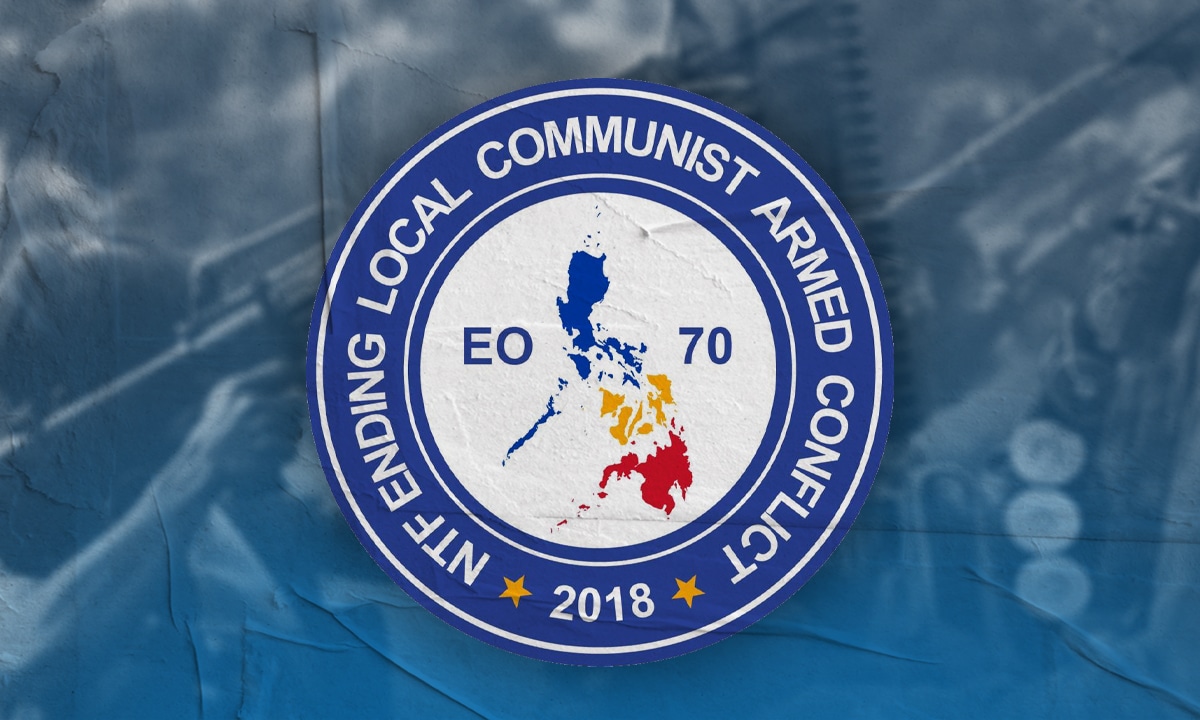
NTF-ELCAC file photo
MANILA, Philippines—When government agencies closely tied to academics and science disclosed their involvement in a task force known for red-tagging, it raised alarm among lawmakers, advocacy groups, and educational institutions.
The recent confirmation that the Department of Science and Technology (DOST) and the Commission on Higher Education (CHEd) are part of the National Task Force to End Local Communist Armed Conflict (NTF-Elcac) has sparked widespread concern.
Both agencies are now under scrutiny, by various organizations questioning their roles in the government body that has faced countless accusations of red-tagging and alleged suppression of dissent.
No publicized amendment
Last month, CHEd chairman Prospero de Vera III confirmed that the agency is one of the newest members of the NTF-Elcac.
“The list of agencies has been expanded, Madam Chair. Even in the previous administration,” De Vera said on August 8 at a hearing on the CHEd 2025 budget in the House of Representatives.
“The additional members were sworn into office by the President recently,” he said.
He added that, like the secretaries of all major departments, he is now one of the task force’s members.
Kabataan Rep. Raoul Manuel questioned the legal basis for the “bothersome” inclusion of CHEd in the task force. Manuel stressed that Executive Order (EO) No. 70 clearly specifies which government agencies are members of the NTF-Elcac, and CHEd is not among those listed.
READ: CHEd’s membership in NTF-Elcac alarms Kabataan solon
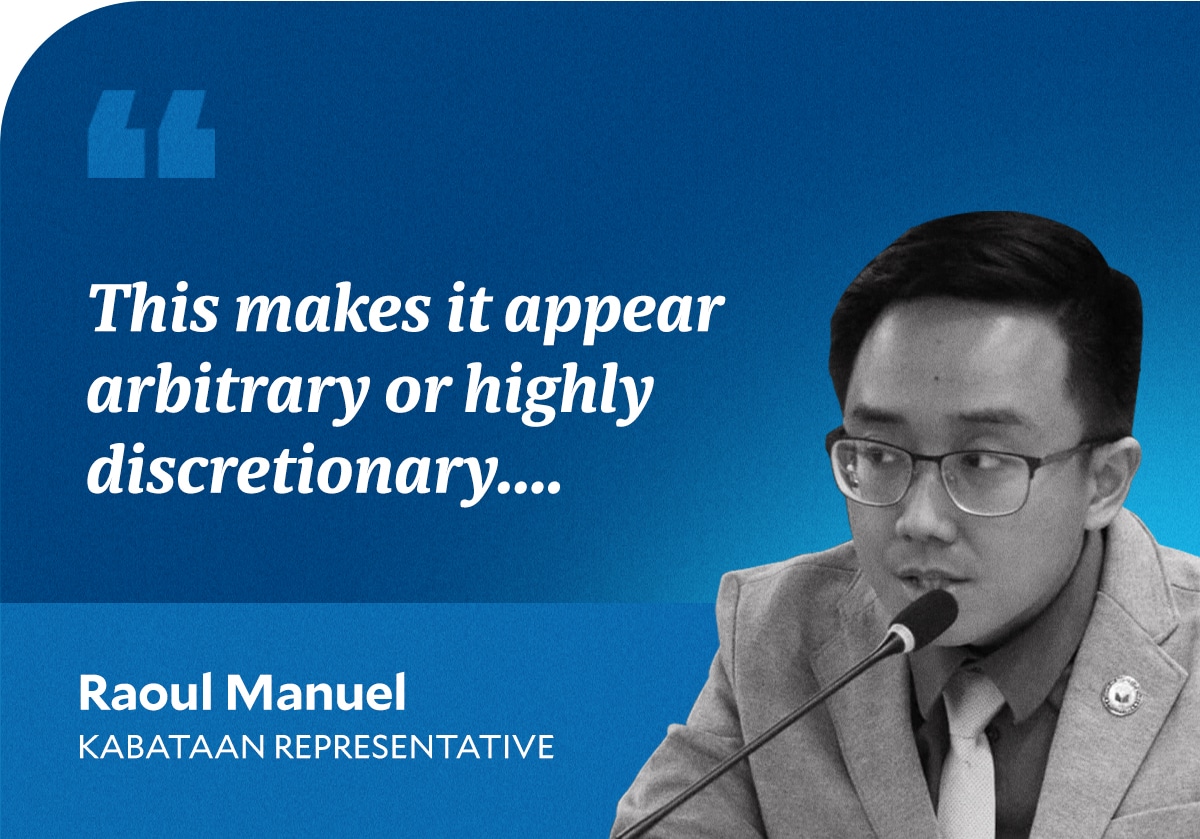
GRAPHIC: Ed Lustan
Section 3 of Executive Order No. 70 issued by then President Rodrigo Duterte on December 4, 2018 states that the National Task Force to End Local Communist Armed Conflict (NTF-Elcac shall be headed by:
- the President of the Republic of the Philippines, as Chair
- the National Security Adviser, as Vice-Chair
The Task Force is also composed of the following members:
- Secretary, Department of the Interior and Local Government,
- Secretary, Department of Justice,
- Secretary, Department of National Defense,
- Secretary. Department of Public Works and Highways;
- Secretary, Department of Budget and Management;
- Secretary, Department of Finance;
- Secretary, Department of Agrarian Reform;
- Secretary, Department of Social Welfare and Development;
- Secretary, Department of Education;
- Director General, National Economic and Development Authority;
- Director General, National Intelligence Coordinating Agency;
- Director General, Technical Education and Skills Development Authority:
- Presidential Adviser on the Peace Process;
- Presidential Adviser for Indigenous Peoples’ Concerns;
- Chief of Staff, Armed Forces of the Philippines;
- Director General, Philippine National Police,
- Chairperson, National Commission on Indigenous Peoples,
- Secretary, Presidential Communications Operations Office, and
- Two (2) Representatives from the private sector.
The lawmaker noted that the NTF-Elcac did not publicize any amendments or supplemental guidelines related to the EO.
“Unfortunately, Madam Chair, no amendments or supplemental guidelines for EO 70 have been publicized. This makes it appear arbitrary or highly discretionary as to who becomes a part of the task force,” Manuel said.
“Where in CHEd’s mandate does it state that it should cooperate with this kind of task force?” he asked.
Information dissemination?
De Vera explained that CHEd’s role as a new member of the NTF-Elcac is focused on information dissemination within higher education institutions.
“The NTF-Elcac shares government programs and information with students,” he clarified.
“Our role is in information dissemination. If agencies have requests or activities that require funding, we mobilize higher education institutions to serve as venues for disseminating information from government agencies,” he added.
NTF-Elcac has implemented several counterinsurgency strategies aimed at preventing alleged communist recruitment in schools. These strategies, however, have drawn controversy, particularly for their practice of red-tagging— labeling individuals or organizations as communist rebels or sympathizers.
The task force has engaged in various activities in educational institutions that it claims are aimed at raising awareness about the dangers of recruitment by the Communist Party of the Philippines (CPP) and the New People’s Army (NPA).
This includes hosting forums, distributing informational materials, and conducting orientation lectures in schools and universities, which lawmakers and human rights organizations have criticized.
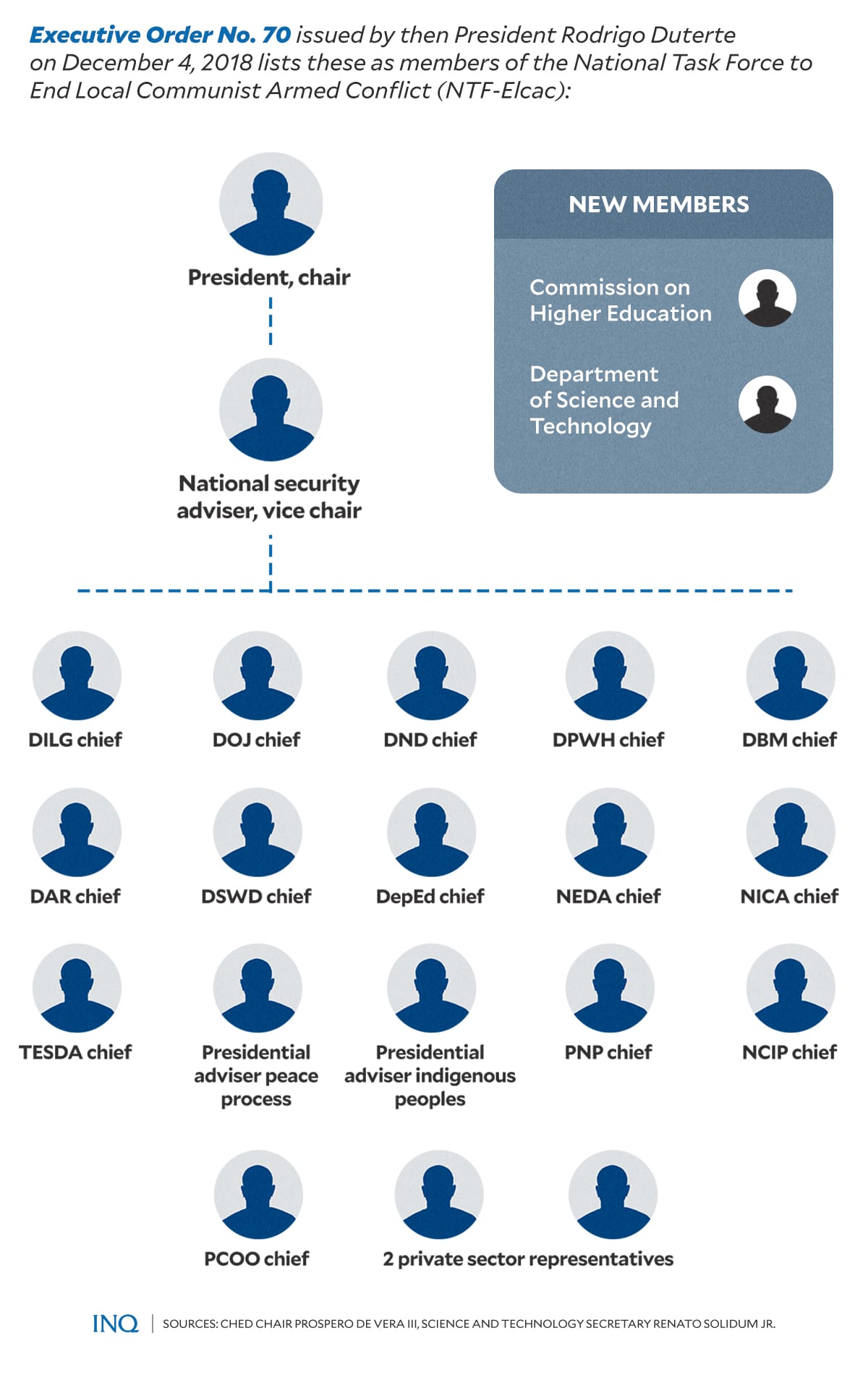
GRAPHIC: Ed Lustan
For example, in 2020, then Kabataan Rep. Sarah Elago urged CHEd to stop the NTF-Elcac from “infiltrating” universities with “libelous” lectures.
She said these lectures, presented during the National Service Training Program (NSTP) in several institutions, were unauthorized, unapproved, and aimed at demonizing student activists.
More recently, ACT Teachers Rep. France Castro condemned the task force for conducting what she described as red-tagging lectures in schools.
Castro said these lectures, presented as anti-insurgency awareness sessions, have labeled student organizations, activists, and even some educational institutions as having ties to communist rebels.
She argued that this kind of rhetoric not only vilifies legitimate dissent but also puts students and educators at risk of harassment and intimidation from authorities.
READ: ACT solon slams NTF-Elcac for ‘red-tagging’ lectures in schools
Since its establishment in December 2018, the task force, which aims to end the “local armed communist conflict” through a whole-of-government approach has faced repeated accusations of red-tagging individuals and groups.
This practice has brought a chilling effect on freedom of expression and has created a climate of fear in universities. Institutions like the University of the Philippines (UP) and other educational bodies have strongly condemned these actions, describing them as baseless, paranoid, and harmful to democratic freedoms.
Asked to become a member
Following De Vera’s disclosure, Science and Technology Secretary Renato Solidum Jr. also confirmed the department’s inclusion in the NTF-Elcac. However, he acknowledged that the specifics of DOST’s role within the task force are still unclear.
During the House committee discussions on DOST’s proposed 2025 budget last week, Solidum mentioned that the agency was “likely” chosen by the NTF-Elcac to aid communities targeted by the task force in disaster management, environmental protection, health, nutrition, and education.
“We have various programs, especially community empowerment through science and technology. So I think they needed us to look into how we could help further improve those communities we were already serving,” he added.
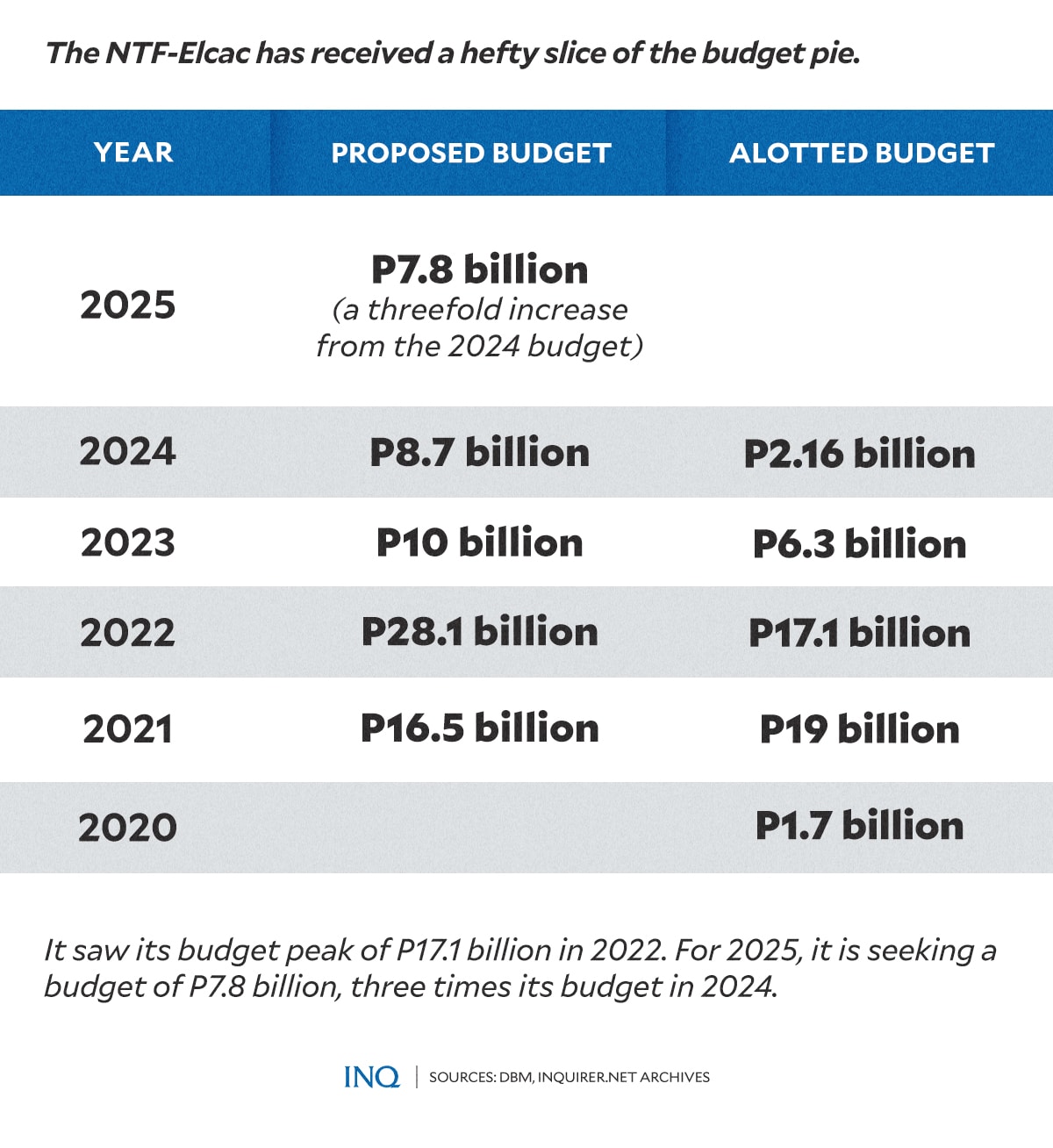
GRAPHIC: Ed Lustan
Solidum also explained that the department received a letter late last year from the NTF-Elcac chair, national security adviser Eduardo Año, saying that the department would now become part of the task force.
“The letter was sent to me asking if we could be a member,” Solidum replied to Manuel, who asked whether the DOST had volunteered to join the task force or if it had been approached to do so.
Manuel suggested that the selection process for determining which agencies join the task force seems to be arbitrary or highly discretionary.
‘Deeply ironic’
In a statement, the group AGHAM – Advocates of Science and Technology for the People criticized the DOST after Solidum confirmed the agency’s membership in the NTF-Elcac, which the group described as “one of the most rabid enforcers of state fascism in the country.”
“It is deeply ironic that the chief science agency is working in collaboration with NTF-Elcac, one of the most unscientific entities in the country, notorious for its role in red-tagging, illegal arrests, and killings of activists, human rights advocates, and state critics,” said AGHAM National Chairperson Chuckie Calsado.
“Time and again, the task force has proven its absolutist stand against progressive groups and individuals, often ignoring evidence proving the innocence and advocacies of its victims,” he added.
AGHAM argued that the DOST should focus on advancing science and technology for the benefit of the people, rather than supporting a task force associated with repression and violence.
The organization further warned that the DOST’s participation would only lead to the misuse of science and technology for “more dangerous surveillance systems, deadlier weaponry, and further destruction of communities and the environment, and the rationalization of killing people’s scientists by tagging them as ‘terrorists’.”
The group urged the DOST to reconsider its involvement, especially since, as Solidum himself admitted, the agency’s role within the task force is unclear.
Prioritize scholars
The UP DOST Scholars’ Association also condemned the department’s involvement with the government’s anti-communist task force, which they described as notorious for red-tagging and human rights violations.
“Their actions clearly violate human rights, including the ruthless killings and red-tagging of activists and journalists. This kind of agenda will never align with the mandate of an agency that should be advancing science and technology for the benefit of the Filipino people,” the student organization said.
They stressed that instead of engaging with NTF-Elcac, the DOST should prioritize the welfare of its scholars who have long struggled with severe bureaucratic red tape in receiving their allowances, causing significant burdens on their studies and daily lives.
“The issue of budget cuts, which directly affects the future of every student, should not be ignored!” the student organization added.
During last week’s budget hearing, DOST-SEI Officer-in-Charge Albert Mariño explained why it takes months to release stipends for DOST scholars, particularly those in the National Capital Region (NCR) and CALABARZON.
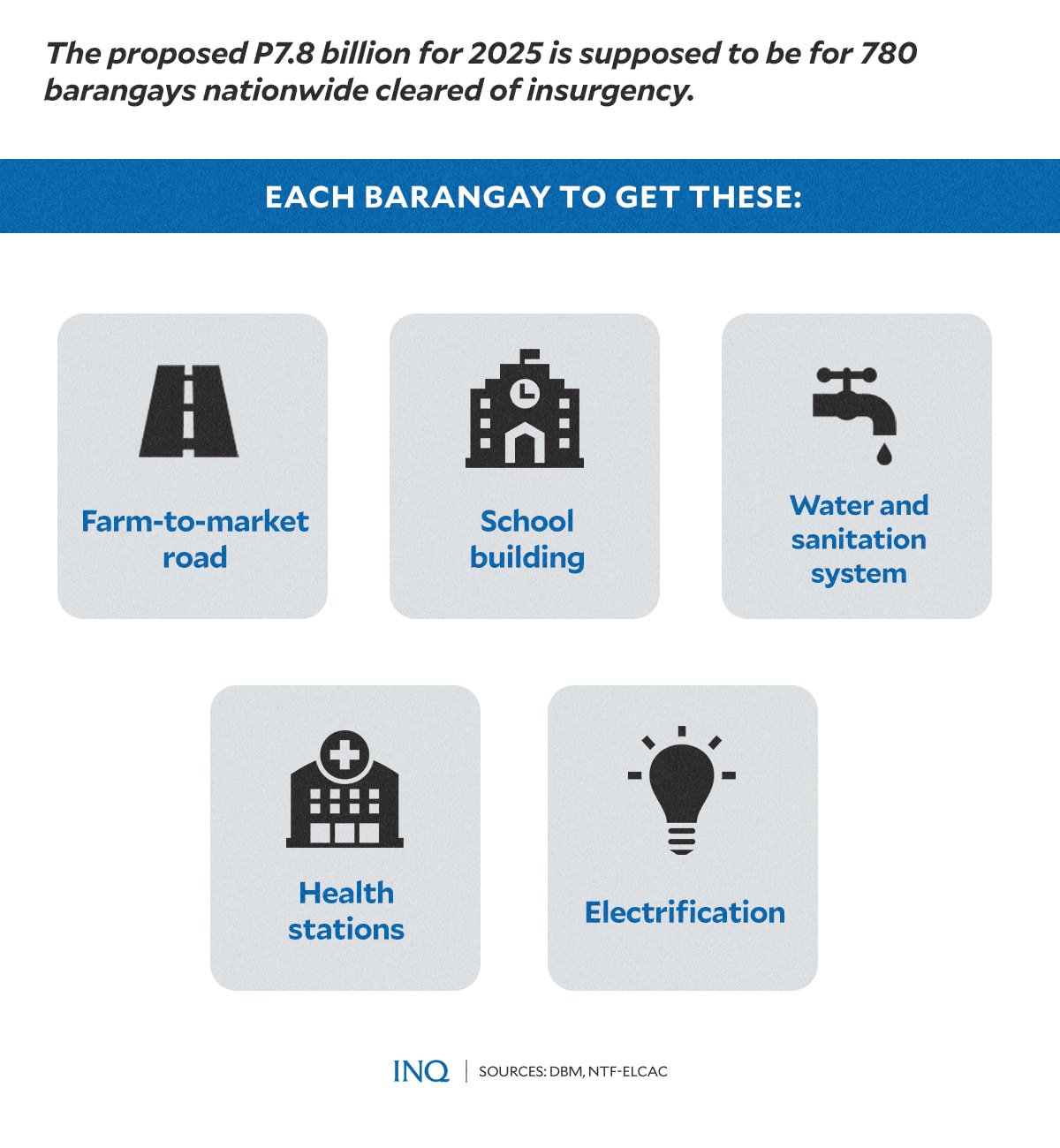
GRAPHIC: Ed Lustan
He stated that the Department of Budget and Management (DBM) had denied the agency’s request for additional funding.
“We requested additional appropriations for our needs, but it was not approved by the DBM at that time,” he said.
On the other hand, Department of Budget and Management (DBM) Assistant Director Joanna Galarpe clarified that there is currently no pending request with their agency for additional cash allocation for this matter.
On the other hand, Solidum pointed out that delays could also be due to universities where students are slow to submit their grades, which is necessary for DOST-SEI to continue providing stipends to scholars.
No plan to abolish NTF-ELCAC
AGHAM called for the abolition of the NTF-Elcac, stating that its existence poses a threat to human rights and contradicts the fundamental purpose of science and technology, which should be to improve lives rather than “aid in the oppression of our own people.”
Before this, several lawmakers, organizations, and advocacy groups had repeatedly called for the task force’s dissolution. In February, United Nations (UN) Special Rapporteur Irene Khan also recommended abolishing the NTF-Elcac.
READ: Abolish the outdated NTF-Elcac – UN Special Rapporteur Khan
A few months later, in April, human rights group Amnesty International pressed the government to dissolve the task force, expressing concern over the alleged misuse of the Anti-Terror Law and red-tagging.
According to Amnesty International Philippines Director Butch Olano, both the Anti-Terror Law and red-tagging were being used by NTF-Elcac to link journalists and human rights advocates to the communist insurgency.
However, in May, President Ferdinand Marcos Jr. stated that there were no plans or reasons to abolish the task force. He maintained that the NTF-Elcac is meant to support insurgents willing to return to the folds of law.
READ: Marcos says no plan or reason to abolish NTF-Elcac
Meanwhile, the anti-communist task force’s budget for 2025 is expected to increase to P7.8 billion — over three times the allotted PHP 2.16 billion for 2024.
The P7.8 billion for the task force under the 2025 National Expenditure Program (NEP) will be used for the implementation of specific programs and projects for 780 cleared barangays across the country.
Each cleared barangay is said to be allocated an amount to be used for the following projects:
- farm-to-market road
- school building
- water and sanitation system
- health stations
- electrification
“Cleared” barangays refer to barangays or villages that are supposedly cleared of communist terrorist groups.
These barangays are included in the anti-communist task force’s Barangay Development Program (BDP) — the NTF-Elcac’s flagship initiative to “promote development in the grassroots level,” to address and fund the needs and concerns of impoverished barangays and carry out projects to deliver basic needs to their communities.
NTF-Elcac has seen varying budgets over the years, with a notable increase from P1.7 billion in 2020 to 19 billion in 2021. Out of the P19 billion, P16.4 billion was set to be allocated to BDP, with each of over 800 barangays receiving P20 million.
This allocation has faced criticism and opposition from many lawmakers who were concerned about transparency and potential misuse of funds.
READ: Senate, House set NTF-Elcac budget at P17.1-B for 2022
The task force saw its budget peak at PHP 17.1 billion in 2022. To increase the NTF-Elcac budget for 2022, the bicameral conference committee made cuts to the budget of the Department of Transportation and other agencies.